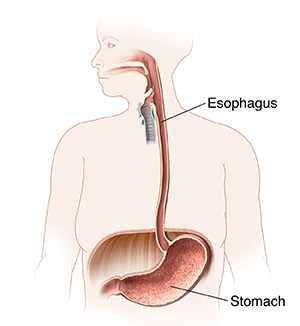Esophageal Cancer: Newly Diagnosed
Being told you have esophageal cancer can be scary. You may have many questions. Know
that you have people on your healthcare team who can help.

Coping with fear
It’s normal to feel afraid. Learning about cancer and your treatment options can help
you feel less scared. It also helps you work with your healthcare team and make the
best choices for your treatment.
Working with your healthcare team
You'll likely have different types of providers on your healthcare team. These might
include:
-
Gastroenterologist. This healthcare provider specializes in treating diseases of the digestive or gastrointestinal
system.
-
Thoracic surgeon. This healthcare provider uses surgery to treat diseases in the chest. The medical
word for chest is thorax.
-
Medical oncologist. This healthcare provider specializes in treating cancer with medicines like chemotherapy,
targeted therapy, or immunotherapy.
-
Radiation oncologist. This healthcare provider specializes in treating cancer with radiation therapy.
Many other healthcare providers will be part of your team, too. These may include
physician assistants (PAs), nurse practitioners (NPs), oncology nurses, dietitians,
social workers, and counselors. They will answer any questions you may have. They’ll
help you through each of the steps you’ll take before, during, and after treatment.
Your team will let you know what tests you need and the results of those tests. They’ll
guide you in making treatment decisions. They’ll also help prepare you and your loved
ones for what’s ahead.
Learning about treatment options
To decide the best course of treatment for you, your healthcare team needs to know
as much as they can about you and the cancer. This means getting tests and scans.
You may work with more than 1 healthcare provider. You may also decide you want to
get a second opinion. This can help you make treatment choices and feel good about
the choices you make. Your team can help you get a second opinion.
Getting support
Coping with cancer can be very stressful. Talk with your healthcare team about seeing
a counselor. They can refer you to someone who can help. You can also join support
groups to talk with other people coping with esophageal cancer. Ask your healthcare
team about local or online support groups.